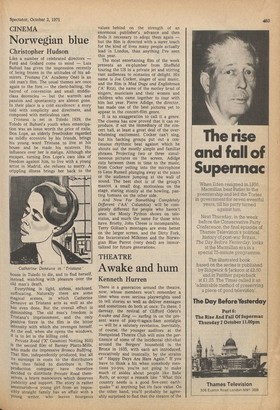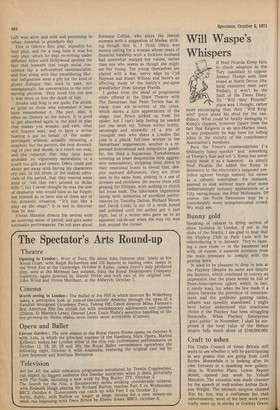Awake and hum
Kenneth Hurren
There is a generation around the theatre, now, whose members won't remember a time when even serious playwrights used to tell stories as well as deliver messages and sometimes do both at once. To these, I daresay, the revival of Clifford Odets's Awake and Sing — surfing in on the present wave of play-it-again-Sam nostalgia — will be a salutary revelation. Inevitably, of course, the younger auditors at the Hampstead Theatre Club will miss the pertinence of some of the incidental chit-chat around the Bergers' household in the Bronx in 1935, with each act introduced, evocatively and ironically, by the strains of "Happy Days Are Here Again." If you have to think a bit when somebody mentions yo-yos, you're not going to make much of asides about people like Babe Ruth, or accept a remark like "What this country needs is a good five-cent earthquake" at anything but its face value. On the other hand, you'll probably be agreeably surprised to find that the theatre of the Left was alive and well and protesting in urban America in grandpa's day.
This is Odets's first play, arguably his best play, and for a long time it was his only play, which he kept re-writing under different titles until Hollywood spotted the fact that beneath that tough social conscience lay a soft-centred sentimentalist, and that along with that smouldering Marxist indignation went a gift for the kind of glossy dialogue that used to pass, not unengagingly, for conversation in the cuter moving pictures. They lured him out and it was more or less the death of him.
Awake and Sing is not quite, I'm afraid, as good as those who remember it may have remembered it. The past, alas, is often as illusory as the future. It is good to get absorbed again in the kind of play that makes you wonder, and care, what will happen next, and to have a writer busting a gut on behalf of the underprivileged without actually mounting a soapbox; but the pattern, the neat dovetailing of plot and theme, is a touch too neat, and the repartee that may once have sounded so vigorously naturalistic is a touch too glib and ornate. Odets could just about get away with having his characters cry out, in the idiom of the radical editorials of the period, that they wanted some kind of "life that isn't printed on dollar bills "; but I never thought he was the sort of dramatist who would have so far forgotten himself as to have one of them say of his domestic situation, " It's just like a play on the stage." It is sad to discover that he was.
Vivian Matalon directs the revival with an unerring sense of period, and gets some estimable performances. I'm not sure about Patience Collier, who plays the Jewish momma with a suggestion of Medea; striking though this is, I think Odets was merely calling for a woman whose years of financia1 hardship with a feckless husband had somewhat warped her values, rather than one who seems as though she might eat her young. The young themselves are played with a fine, nervy edge by Cyd Hayman and Stuart Wilson; and there's an affecting study of the family's put-upon grandfather from George Pravda.
I gather from the sheaf of programme notes offered at the Shaw Theatre with The Samaritan that Peter Terson has already done six re-writes of the piece, which shows a nice appreciation of the adage that Bruce picked up from the spider, but I can't help feeling he needed just one more try. Terson writes boldly, amusingly and shrewdly of a trio of youngish men who share a London flat (one is a placid, full-time worker in the Samaritans' organisation, another is a repressed homosexual and compulsive gambler, the third a loquacious Yorkshireman covering an inner desperation with aggressive camaraderie), stripping them down to their emotional bones to reveal that, despite outward differences, they are three men in the same boat, sinking in a sea of stresses and problems. He leaves them still groping for lifelines, with nothing to clutch but loose ends. The take-home impression (along with memories of excellent performances by Timothy Dalton, Richard Moore and David Cook) is not of a work honed and polished until the author got it just right, but of a writer who gave up in an apparent cul-de-sac when the way out was just around the corner.

































 Previous page
Previous page